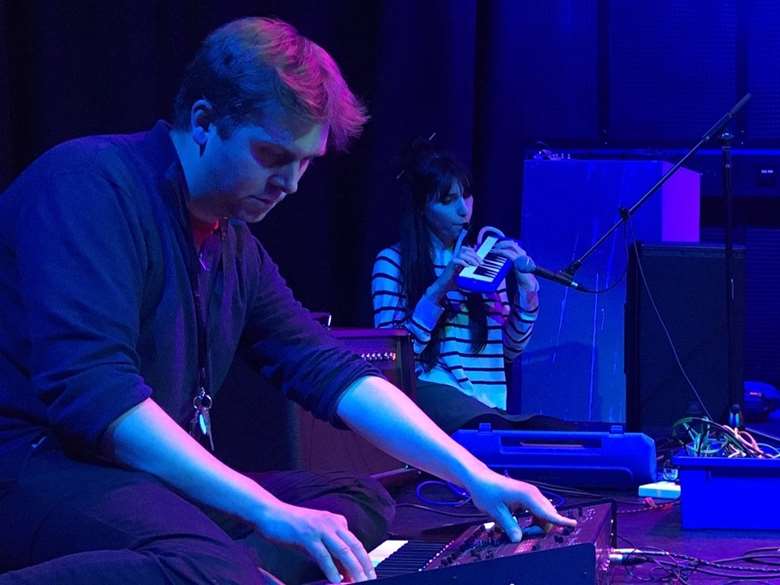Harry Whalley: ‘living in my head’
Harry Whalley
Tuesday, May 23, 2023
Ahead of the premiere of his new work ‘On Memory’ at Kings Place this weekend, composer and academic Harry Whalley reflects on the impact of music on the memory, and gives a taste of what audiences can experience at Saturday’s concert

 In his research, composer and academic Harry Whalley explores the extraordinary power of music to bring back memories, especially for listeners experiencing cognitive decline such as Dementia and Alzheimer's. Whalley’s latest work is set to premiere this Saturday (25 May) at Kings Place, and is a culmination of the composer’s research, seeking to answer the question: How do memories make us who we are? Here, Whalley (pictured right) explains how the project came about, exploring some of the neurological research behind the concept and what audiences can be expected at the premiere.
In his research, composer and academic Harry Whalley explores the extraordinary power of music to bring back memories, especially for listeners experiencing cognitive decline such as Dementia and Alzheimer's. Whalley’s latest work is set to premiere this Saturday (25 May) at Kings Place, and is a culmination of the composer’s research, seeking to answer the question: How do memories make us who we are? Here, Whalley (pictured right) explains how the project came about, exploring some of the neurological research behind the concept and what audiences can be expected at the premiere.
Without memory, music is meaningless – just instantaneous sounds without any connection. As a composer, it is really memory that is the material from which recognition of structure, form, repetition, variation and expectations arise in the listener. It is easy to assume that the music exists in the score, but unless it is comprehended and heard it remains abstract. Memory, therefore, is a bridge between the present and the past, whether that past is simply the beginning of a song, or events in our lives which bring a deep emotional resonance to the music.
On Memory has something new to say – it combines scientific underpinnings with music formed through the libretto of an expert storyteller
My new work On Memory invites audiences to embark on an exploration of the mind. Created in collaboration with renowned neurologist Adam Zeman and best-selling author Alexander McCall Smith (pictured below), this concert delves into the fascinating intersection of music and cognition. The unique blend of artistic expression from performers the Gildas Quartet and soprano Sarah Dacey with scientific insight will unravel the poetic and scientific intricacies of memory.

As a composer and academic, I am often accused of ‘living in my head’. But what does this actually mean?
A musical idea may come from some small experimentation on the piano or from an elaborate and sophisticated process. However, in my case, that idea comes from the same ‘place’ that musical memories are ‘stored’. When we hear a motif or melody, we don’t often immediately remember it in its entirety, or in detail – instead a vaguer shape or image emerges. Similarly, when a new musical idea is formed, it appears at first slightly blurry, and work needs to be done to put it in focus. There is an interesting interplay between memory and imagination – and a way in which visual imagination plays an important role in how we think about music. This is an area where Professor Adam Zeman’s research into hyperphantasia – the condition of having extremely vivid mental imagery – becomes important.
In the landscape of human cognition, hyperphantasia emerges as an exceptional ability, allowing individuals to conjure up strikingly vivid and detailed mental images – and manipulate them in their ‘mind’s eye’. But we don’t just have a mind’s eye, we also have a mind’s ear. Remembering and manipulating sounds in our imagination is the core skill of writing music. For me, it is a fascinating journey to learn more about how our mind operates. The speed of development in neuroscience and psychology is profound, but we must always remember to compare new scientific insights into experience to the nature of the experience itself. What it is like to remember a song from childhood is a specific phenomenon that can be both understood and experienced. This is why I believe On Memory has something new to say – it combines those scientific underpinnings with music formed through the libretto of an expert storyteller. It just so happens that the story being told isn’t narrative, but the story of memory.
This is in fact how On Memory came about, Alexander McCall Smith, Adam Zeman and I were discussing various stories that we could tell in which memory played an important part; loss, reconciliation, trauma, love. Each story had a meta-narrative, the importance of forgetting, a mother’s song, and the reality of aging. The dramatic realisation came when we asked ourselves, what if we simply present the subject of memory, in poetry, prose and music?
Whalley will present the world premiere of On Memory at Kings Place on 27 May. As well as a performance of the work by the Gildas String Quartet and soprano Sarah Dacey, the evening will include poetry and scientific exploration informed by neurologist Professor Adam Zeman and celebrated author Alexander McCall Smith, drawing from their own life experiences and those of others.


